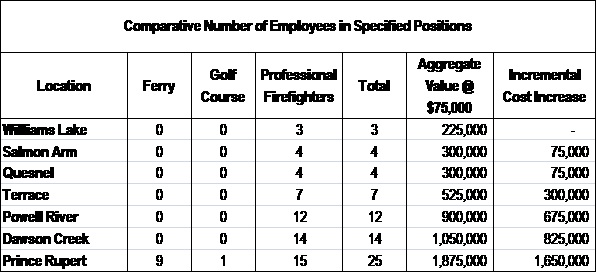Over a week ago, The Prince Rupert Northern View, reported that City of Prince Rupert’s payroll costs were over $5-million more than that of Terrace; a city with only 1,000 fewer people that Rupert.
In fact, Prince Rupert pays more in staffing costs than any other community of its size in BC.
The Northern View compared Prince Rupert to Quesnel, Williams Lake, Powell River, Dawson Creek, Squamish and Salmon Arm; the populations of these communities, according to the 2011 Canadian Census, range from 10,000 people to 17,500 (Prince Rupert has about 12,500). Prince Rupert’s payroll is still larger then every one of these communities.
The closest was Dawson Creek, which still spends $700,000 less than the $12.3-million Prince Rupert spends on its staff.
So why is this? There are a couple of reasons according to the City’s chief financial officer, Dan Rodin.
Prince Rupert is paying for services that most other municipalities do not. The best example is that the City runs the ferry that goes to and from Digby Island something that none of the other municipalities have to do
The Digby Island Ferry service runs everyday and employs nine crewmembers, all of which are making about $75,000 a year.
None of the other municipalities used for comparison with Prince Rupert run their own golf course either. Prince Rupert does, and it pays the salary of the golf course manager, which is also about $75,000 a year.
Then there’s the fact the Prince Rupert has a completely professional Fire Department, rather than a volunteer or mixed fire departments that most of the other municipalities have.

The Prince Rupert Fire Department has 15 professional fire fighters, which are all paid around $75,000 a year or more. Dawson Creek, which has the closest payroll costs to Rupert’s, also has a professional fire department with 14 paid fire fighters.
The fire department along with the golf course and ferry service accounts for about $1.9-million of the City’ payroll costs. But even if you subtract that from the City’s payroll, what remains is still well above the communities’ average payroll of $9.3-million.
One reason for this is likely the fact that there are so many city staff members making $75,000 a year or more. There a total of 45, in fact, compared to the 12 who do in Terrace.
While this is likely to strike many Rupertites as being very high, considering that average British Columbian’s salary is $44,750. Even so, Rodin says that what city workers are making is not out of the norm for public sector employees in BC.
Nor are these salaries levels something that has happened recently, they have been this way for many, many years. And to save money on wages and benefits for city staff could only be done in two ways.
The City would have to convince the public sector unions representing the city workers to take a drastic cut to their salaries or benefits. Nobody, no matter what job they are in will just go along with a 30 percent cut to their pay. So this is effectively a non-starter.
The other way is to save costs by reducing municipal services. If the City has less public services to provide, the less staff will be required in order to provide them.
So the question then becomes: how many reductions in services will Rupertites tolerate in order to save money? Not many, says Rodin.
To illustrate his point he points to the public backlash when Council considered the Moose Tot Park as a possible location for a new emergency building.
Using that site would save hundreds of thousands of dollars in land acquisition and construction costs – money that wouldn’t have to be borrowed and paid back with interest. But that didn’t seem to matter to many who complained to City Hall saying they wanted the park kept open, despite a promise that it would be replaced later.
But clearly not everyone has as much of a problem reducing services as others. During this spring’s budgeting process, there was a very forceful push by a few residents to have city council change the fire department into a volunteer service, which would save the City over a million dollars.
The council wasn’t nearly as certain that was a good idea though. Citing safety concerns and doubts about the ability to find volunteers, decided against examining that possibility any further.

